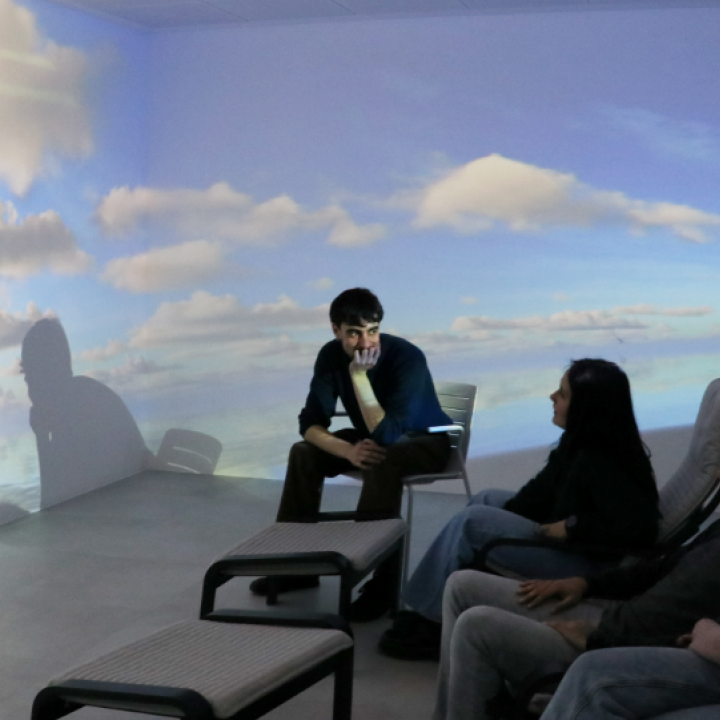Can you imagine a summer without notifications or screens that interrupt your most precious moments? What if we told you that disconnecting from the digital world could be the key to connecting with you and your loved ones?
If you missed the talk on digital disconnection last July 18, here are some of the main ideas to put into practice this summer. At the same time, we invite you to view the conversation that Montse Freixanet and Mònica Arribas had on our Instagram profile.
Among other things, the guests talked about the contradiction between hyper-connection and dependence on electronic devices for many of our daily tasks, and the luck of building a network like the one that this online meeting has facilitated. Montse began by explaining her experience as a mother when she realized that her passion for the digital world compromised her idea of present parenting with her 5 children. A reflection that contributed to training and accompanying other families to build a healthy relationship with technologies and establish strategies such as a digital plan or modulating addictive behaviors.
Aware that we have to live with this reality and that children, from a very young age, are exposed to screens and technologies, Montse and Mònica shared their thoughts and initiatives to facilitate digital detox. In order not to "stop living" and for no one to say the cursed phrase: can you please put down your mobile phone?
Mònica Arribas, director of the El Petit Montgrí nursery school and partner of the cooperative, explained the "Space without screens" initiative, which has provided a meeting place that invites to build a more present relationship shared by the whole community educational In addition, he commented that as a result of a reflection with the team, they have promoted other actions for responsibility and consistency. "We were missing a certain presence due to the fact that paper diaries have evolved into a digital tool, which is wonderful, but due to the fact that we carry our mobile phones with us sometimes it takes away our attention". In this regard, the director also shared her strategy in the office, so that families do not abuse their mobile phones, and that it is as simple as having a basket of games at the children's disposal.

In relation to this, Montse shared "that there are studies that talk about a certain regret of people at the end of life for not having been present and sharing more moments with loved ones" and adds, "that no one will remember us for money that we have accumulated throughout life". In the thread, Mònica mentioned why they chose the phrase on the poster of Tell fusta's Space without screens: "be there for me" which somehow says let's play folded.
They also mention that in the context of the nursery school, sometimes "a lot of photos are taken", and you need to be aware to modulate their use. For example, the school has agreed to access the "digital agenda" application at specific times and at the most appropriate time, such as children's break time.
The challenges of technology in early childhood: practical guidelines
- The influence of electronic devices on child development:
- Impact on language development and communication: because they have fewer opportunities for interaction to learn.
- Disorders of attachment and affection: research suggests that the mobile phone can come between the development of affection between the child and the primary caregiver. This can have an effect on brain development and emotions. In fact, some evidence that they can be more insecure and restless. Montse talks about the abandonment of the 21st century which in some way implies leaving them aside and depriving them of attention and love.
- Consequences in attention and concentration: especially for teenagers who usually have sleep problems, due to the abuse of screens and delay in their circadian rhythm.
- Relationship with behavioral problems and sleep disturbances.
- Benefits of technology when used appropriately.
- The role of the family and educators:
- The importance of setting digital boundaries and routines at home:
- How to encourage healthy habits in the use of electronic devices: adults are the first to reflect and change habits, Monica explains the school team we have committed to setting responsible hours for our communication such as the Telegram group or mail.
- At school, adults must make a commitment to limit the use of personal or work mobile phones to be consistent with our commitment to a screen-free childhood from 0 to 3, which also involves being a role model.
For educators and families: take care to have creative resources, books, lap songs, games to put words to things, in short to share experiences and knowledge.
3. The importance of human connection:
- The need to foster interpersonal relationships and symbolic play.
- How to establish strong emotional bonds with children.
- The impact of the presence of adults on the emotional development of children.
- Tell stories to children! Stimulate creativity and encourage language acquisition.
How do I know I have a cell phone addiction? Some warning signs
The speaker explained that there are direct types of behavioral and behavioral addictions, but they all share the reduction of the person's freedom of choice. She loses control of herself and becomes a slave. We should consider, among others:
- If it's the first thing you look at when you wake up and the last thing when you go to sleep.
- If you have the need to look at the notifications, and even if you remove them, what is called "phantom noise" happens.
- If not being connected gives you anxiety and the day you decide to disconnect you feel anxious.
- If your current socialization is being replaced by a digital one.
What can we do?
- Create spaces free of mobile phones, for example to avoid the use of mobile phones in the room, let's go back to the traditional alarm clock.A visual timer that replaces the mobile that has apps and notifications.
- Create screen-free spaces at home.
- Encourage alternative activities such as reading, playing and physical exercise.
- Use quality educational apps and devices: limit or remove the ones we don't use.
- Establish family rules about the use of technology.
- Eliminate mobile phones at meals and recover the relationship and interaction between the members of the family nucleus.
- We try not to make it an evasion mechanism and run away from reality, because evasion is necessary to do it with the mobile phone has certain dangers.
Are you ready or up for the challenge? Share the challenge and tell us how you did on the networks!





